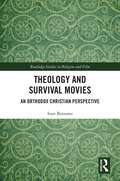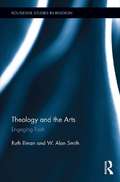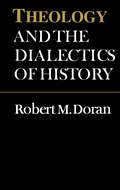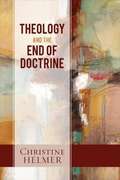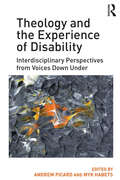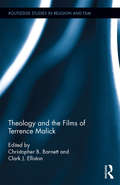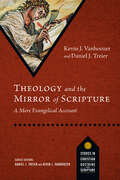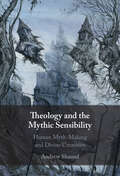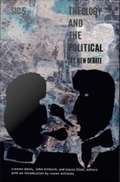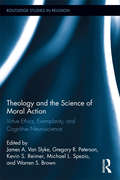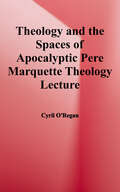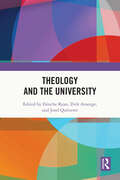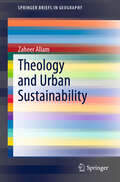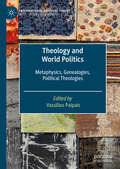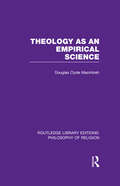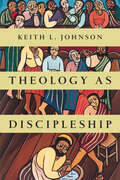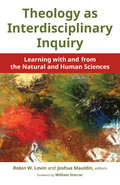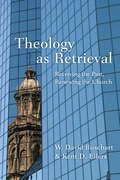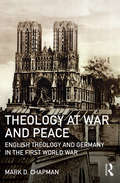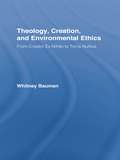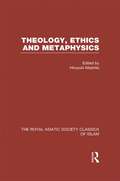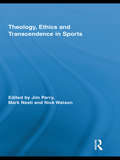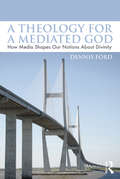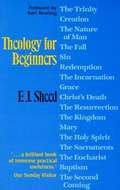- Table View
- List View
Theology and Survival Movies: An Orthodox Christian Perspective (Routledge Studies in Religion and Film)
by Ioan ButeanuThis book provides an innovative analysis of the survival movie genre from an Orthodox Christian anthropological perspective. Grounded in the Orthodox tradition, the approach builds from the first chapter of Genesis where man is described as made in the ‘image’ and after the ‘likeness’ of God. It offers a nuanced theological exploration of the concept of the survival movie and examines a number of significant cinematic creations, illustrating how issues of survival intersect romantic, Western, science fiction and war films. The author reflects on how survival movies offer a path for the study of human nature given they depict people in crisis situations where they may reveal their true characters. As well as discussing the role of a ‘limit situation’ as a narrative element, the book highlights the spiritual aspect of survival and points to the common hope in survival movies for something more than biological survival. It is valuable reading for scholars working in the field of religion and film.
Theology and the Arts: Engaging Faith (Routledge Studies in Religion #29)
by Ruth Illman W. Alan SmithThis book brings the emerging fields of practical theology and theology of the arts into a dialogue beyond the bias of modern systematic and constructive theology. The authors draw upon postmodern, post-secular, feminist, liberation, and dialogical/dialectical philosophy and theology, and their critiques of the narrow modern emphases on reason and the scientific method, as the model for all knowledge. Such a practical theology of the arts focuses the work of theology on the actual practices that engage the arts in their various forms as the means of interpreting and understanding the nature of the communities and their members, as well as the mechanisms through which these communities engage in transformative work, to make persons and neighborhoods whole. This book presents its theological claims through the careful analysis of several stories of communities around the world that have engaged in transformational practices through a specific art form, investigating communities from Europe, the Middle East, South America, and the U.S. The case studies explored include Jewish, Christian, Muslim, Druze, indigenous, and sometimes agnostic subjects, involved in visual art, music, dance, theatre, documentary film, and literature. Theology and the Arts demonstrates that the challenges of a postmodern and post-secular context require a fundamental rethinking of theology that focuses on discrete practices of faithful communities, rather than one-dimensional theories about religion.
Theology and the Dialectics of History
by Robert Doran, S.J.In this challenging work Robert M. Doran explores the basis of systematic theology in consciousness, and goes on to consider the practical role of such theology in establishing and fostering communities with an authentic way of life. This way of life would counteract the distortions and deformations of humanity that are exemplified by both late capitalism and Marxism. Theology positions and interpretations today, argues Doran, must be stated in the categories of a theory of history. The first part of the book outlines the horizon required for such categories. The second,, third, and fourth parts incrementally derive the categories expressing a theory of history in terms of the reciprocal relations among subjects, cultures, and social structures. The final part, on hermeneutics, oresents an argument for the pertinence of what has preceded for interpreting the words and deeds of others. Doran draws extensively on the thought of Bernard Lonergan, and the work develops Lonergan's methodological insights. It issues a call to persona; genuineness and authenticity, informed by religious, moral, intellectual, affective, and psychic 'conversions,' by 'interior' differentiation of one's consciousness, and by Christian faith, on the parts of theologians who aspire to arrest effectively the course of cultural decline.
Theology and the End of Doctrine
by Christine HelmerThis book is about the crisis brought about by doctrine's estrangement from reality--that is from actual lives, experiences, histories, and from God. By invoking "the end of doctrine," Christine Helmer opens a new discussion of doctrinal production that is engaged with the challenges and possibilities of modernity. The end of doctrine refers on the one hand to unquestioning doctrinal reception, which Helmer critiques, and on the other, represents an invitation to a new way of understanding the aim of doctrine in deeper connection to the reality that it seeks. The book's first section offers an analysis of the current situation in theology by reconstructing a trajectory of Protestant theology from the turn of the twentieth century to today. This history focuses primarily on the status of the word in theology and explains how changes in theology in the context of the political and social crisis in Europe in the 1920s and 1930s led to a distancing of the word from reality. Helmer then turns to the constructive section of the book to propose a repositioning of theology to the world and to God. Helmer's powerful work will inspire revitalized interest in both doctrine and theological inquiry itself.
Theology and the Experience of Disability: Interdisciplinary Perspectives from Voices Down Under
by Andrew Picard Myk HabetsThe Christian gospel compels humanity to embrace deeper ways of being human together that will overcome false divisions and exclusions in search of flourishing and graced communities. Presenting both short narratives emerging out of theological reflection on experience and analytical essays arising from engagement in scholarly conversations Theology and the Experience of Disability is a conscious attempt to develop theology by and with people with disabilities instead of theology about people with disabilities. A mixture of academic, professional, practical, and/or lived experience is brought to the topic in search of constructive multi-disciplinary proposals for church and society. The result is an interdisciplinary engagement with the constructive possibilities that emerge from a distinctly Christian understanding of disability as lived experience.
Theology and the Films of Terrence Malick (Routledge Studies in Religion and Film)
by Christopher B. Barnett Clark J. EllistonTerrence Malick is one of the most important and controversial filmmakers of the last few decades. Yet his renown does not stem from box office receipts, but rather from his inimitable cinematic vision that mixes luminous shots of nature, dreamlike voiceovers, and plots centered on enduring existential questions. Although scholars have thoroughly examined Malick’s background in philosophy, they have been slower to respond to his theological concerns. This volume is the first to focus on the ways in which Malick integrates theological inquiries and motifs into his films. The book begins with an exploration of Malick’s career as a filmmaker and shows how his Heideggerian interests relate to theology. Further essays from established and up-and-coming scholars analyze seven of Malick’s most prominent films – Badlands (1973), Days of Heaven (1978), The Thin Red Line (1998), The New World (2005), The Tree of Life (2011), To the Wonder (2012), and Knight of Cups (2015) – to show how his cinematic techniques point toward and overlap with principles of Christian theology. A thorough study of an iconic filmmaker, this book is an essential resource for students and scholars in the emerging field of religion and film.
Theology and the Gospel of Christ: An Essay in Reorientation
by E. L. MascallThe four chapters of which this book is composed have more in common than may appear on the surface. They are the outcome of a conviction, reached with reluctance and distress and after long and anxious thought, that the theological activity of the Anglican Churches is in a condition of extreme, though strangely complacent, confusion and that this is having a disastrously demoralizing effect upon the life and thought of the Church as a whole and of the pastoral clergy in particular.
Theology and the Mirror of Scripture: A Mere Evangelical Account (Studies in Christian Doctrine and Scripture)
by Kevin J. Vanhoozer Daniel J. TreierEvangelicalism has long been a hotly disputed label, and what counts as evangelical theology is often anyone?s guess. Is evangelicalism a static bounded set defined by clear doctrinal limits, or is it a dynamic centered set without a discernible circumference? In this inaugural volume in the Studies in Christian Doctrine and Scripture, Kevin Vanhoozer and Daniel Treier present evangelical theology as an "anchored" set, rooted in the Trinity. In response to increasing evangelical fragmentation, Theology and the Mirror of Scripture offers a clarion call to reconceive evangelical theology theologically by reflecting on the God of the gospel as mirrored in Scripture. Such "mere" evangelical theology will be an exercise in Christian wisdom for the purpose of building up the fellowship of saints.
Theology and the Mythic Sensibility: Human Myth-Making and Divine Creativity
by Andrew ShamelHow do stories change the way we see both ourselves and the world? That question is the starting-point of this accomplished new contribution to narrative theology. Dr Shamel addresses what he calls mythopoieic fantasy: the fictionalised myth-making occupying those twilight borderlands between contemporary secularity and a religious worldview. Exploring key writers such as J. R. R. Tolkien, Terry Pratchett, and J. K. Rowling, the author argues that the mythic turn of popular culture signals an ongoing hunger for something 'more': more dense, more present, more 'real'. For Dr Shamel, mythopoieic fantasy and Christian theology represent the same human impulse: a desire to participate in the divine. Despite the avowed secularity of many authors of fantasy literature, the creativity of their mythic fictions reveals something of the theological character of all human making. The stories we tell in order to encounter the world as meaningful, argues Dr Shamel, in fact emerge within a theological horizon.
Theology and the Political: The New Debate
by Creston Davis John Milbank Slavoj I EkThe essays in Theology and the Political--written by some of the world's foremost theologians, philosophers, and literary critics--analyze the ethics and consequences of human action. They explore the spiritual dimensions of ontology, considering the relationship between ontology and the political in light of the thought of figures ranging from Plato to Marx, Levinas to Derrida, and Augustine to Lacan. Together, the contributors challenge the belief that meaningful action is simply the successful assertion of will, that politics is ultimately reducible to "might makes right. " From a variety of perspectives, they suggest that grounding human action and politics in materialist critique offers revolutionary possibilities that transcend the nihilism inherent in both contemporary liberal democratic theory and neoconservative ideology. Contributors. Anthony Baker, Daniel M. Bell Jr. , Phillip Blond, Simon Critchley, Conor Cunningham, Creston Davis, William Desmond, Hent de Vries, Terry Eagleton, Rocco Gangle, Philip Goodchild, Karl Hefty, Eleanor Kaufman, Tom McCarthy, John Milbank, Antonio Negri, Catherine Pickstock, Patrick Aaron Riches, Mary-Jane Rubenstein, Regina Mara Schwartz, Kenneth Surin, Graham Ward, Rowan Williams, Slavoj Zizek
Theology and the Science of Moral Action: Virtue Ethics, Exemplarity, and Cognitive Neuroscience (Routledge Studies in Religion)
by Warren S. Brown Kevin S. Reimer James A. Van Slyke Gregory R. Peterson Michael L. SpezioThe past decade has witnessed a renaissance in scientific approaches to the study of morality. Once understood to be the domain of moral psychology, the newer approach to morality is largely interdisciplinary, driven in no small part by developments in behavioural economics and evolutionary biology, as well as advances in neuroscientific imaging capabilities, among other fields. To date, scientists studying moral cognition and behaviour have paid little attention to virtue theory, while virtue theorists have yet to acknowledge the new research results emerging from the new science of morality. Theology and the Science of Moral Action explores a new approach to ethical thinking that promotes dialogue and integration between recent research in the scientific study of moral cognition and behaviour—including neuroscience, moral psychology, and behavioural economics—and virtue theoretic approaches to ethics in both philosophy and theology. More particularly, the book evaluates the concept of moral exemplarity and its significance in philosophical and theological ethics as well as for ongoing research programs in the cognitive sciences.
Theology and the Spaces of Apocalyptic
by Cyril O'ReganO'Regan pointed to the "exile" of apocalyptic in the modern period, and its "contemporary return" in a host of theologians, including, but not limited to: Hans Urs von Balthasar, Jurgen Moltmann, Johann Baptist Metz, Sergei Bulgakov, Karl Barth, Stanley Hauerwas, Jacques Derrida, (to a limited extent) the Pope Benedict XVI, David Bentley Hart, Catherine Keller, John D. Caputo, and Gianni Vattimo. Apocalyptic is not so exotic before, especially since we find such diverse thinkers sharing the same theological "spaces" (e.g. Balthasar, the "Pope's theologian," and Derrida, share the same space - this is surprising) O'Regan finds it helpful to map out three spaces in order to distinguish these different thinkers. He has three of them: 1) Pleromatic: maximum level of content; 2) Metaxic: in-between level of content; and 3) Kenomatic: empty of content.
Theology and the University
by Fáinche Ryan Dirk Ansorge Josef QuittererTheology and the University presents a compelling argument as to why theology still matters. It considers how theology has been marginalised in the academy and in public life, arguing that doing so has serious repercussions for the integrity of the academic study of religion.The chapters in this book demonstrate how theology, as the only discipline which represents religion from within, provides insight into aspects of religion which are hidden from the social sciences. Against a backdrop of heated debates on the role of the humanities in the university, the book highlights the specific contribution of theological education and research to the work of a university, providing essential information for academic and social/political decision-making. Whilst the book has an emphasis on the Catholic tradition, it explores the prospect of fruitful complementarity and interdisciplinarity both with secularised studies of religion, and other disciplines in the university, such as literature, philosophy, and the social sciences.This book provides orientation for decision-makers, particularly those concerned with the broader question of humanities in the university; students in their choice of study; those interested in the wellbeing of today’s universities; and ecclesial authorities seeking to form leaders capable of intelligent responses to the issues of contemporary society. It is a must read for all researchers of theology, as well as anyone interested in the role of the humanities more broadly.
Theology and Urban Sustainability (SpringerBriefs in Geography)
by Zaheer AllamEven though theology does provide interesting and important contributions to ethics that laid the foundation of our modern societies, this book looks at exploring how theology has impacted on urban morphology and has led to questionable unsustainable practices which impacts on both climate and societal living standards. This is seen as being accelerated with the impacts of climate change coupled with increasing urbanisation rates that stresses on contemporary notions and foundations, as initially sparked by religion. Through an argumentative style, the author sets forth to explore the ethics of religious dogmas in a rapidly urbanising world that is stressed by increasing consumption from a booming demographic.
Theology and World Politics: Metaphysics, Genealogies, Political Theologies (International Political Theory)
by Vassilios PaipaisSituated within the wider post-secular turn in politics and international relations, this volume focuses not on religion per se, but rather explicitly on theology. Contributions to this collection highlight the political theological foundations of international theory and world politics, recasting theology and politics as symbiotic discourses with all the risks, promises and open questions this relation may involve. The overarching claim the book makes is that all politics has theology embedded in it, both in the genealogical sense of carrying ineradicable traces of rival theological traditions, and also in the more ontological sense of being enacted by alternative configurations of the theologico-political. The book is unique in bringing together a diverse group of scholars, spanning knowledge areas as varied as IR, political theory, philosophy, theology, and history to investigate the complex interconnections between theology and world politics. It will be of interest to students and scholars of political theory, international relations, intellectual history, and political theology.
Theology as an Empirical Science (Routledge Library Editions: Philosophy of Religion)
by Douglas Clyde MacintoshInvestigating the question ‘can theology, description of the divine reality, be made truly scientific?’, this book addresses logic and human knowledge alongside experimental religion. An important philosophic work by a prolific theologian also known for his later court case regarding conscientious objection, this book describes how it is possible to relate theological theory with religious experience of the divine the way that the sciences relate to human acquaintance with things and people in social experience.
Theology as Discipleship
by Keith L. JohnsonFirst Things'GodtalktheologicalTheology as Discipleship
Theology as Interdisciplinary Inquiry: Learning with and from the Natural and Human Sciences
by Robin W. Lovin & Joshua MauldinCan a neuroscientist help a theologian interpret a medieval mystical text? Can a historian of religion help an anthropologist understand the effects of social cooperation on human evolution? Can a legal scholar and a theologian help each other think about how fear of God relates to respect for the law? In this volume leading scholars in ethics, theology, and social science sum up three years of study and conversation regarding the value of interdisciplinary theological inquiry. This is an essential and challenging collection for all who set out to think, write, teach, and preach theologically in the contemporary world.CONTRIBUTORS: John P. Burgess Peter Danchin Celia Deane-Drummond Agustín Fuentes Andrea Hollingsworth Robin W. Lovin Joshua Mauldin Friederike Nüssel Mary Ellen O'Connell Douglas F. Ottati Stephen Pope Colleen Shantz Michael Spezio
Theology as Retrieval: Receiving the Past, Renewing the Church
by Kent Eilers W. David Buschart"Tradition is the living faith of the dead." —Jaroslav Pelikan The movement to retrieve the Christian past is a mode of theological discernment, a cultivated habit of thought. It views the doctrines, practices and resonant realities of the Christian tradition as deep wells for a thirsty age. This movement across the church looks back in order to move forward. David Buschart and Kent Eilers survey this varied movement and identify six areas where the impulse and practice of retrieval has been notably fruitful and suggestive: the interpretation of Scripture, the articulation of theology, the practices of worship, the disciplines of spirituality, the modes of mission and the participatory ontology of Radical Orthodoxy. In each area they offer a wide-angle view before taking a close look at representative examples in order to give finer texture to the discussion. More than a survey and mapping of the terrain, Theology as Retrieval inspires reflection, practice and hope.
Theology at War and Peace: English theology and Germany in the First World War
by Mark D. ChapmanThis book is the first detailed discussion of the impact of the First World War on English theology. Assessing the close relationships between English and German theologians before the First World War, Chapman then explores developments throughout the war. A series of case studies make use of a large amount of unpublished material, showing how some theologians sought to maintain relationships with their German colleagues, while others, especially from a more Anglo-Catholic perspective, used the war as an opportunity to distance themselves from the liberal theology which was beginning to dominate the universities before the war. The increasing animosity between Britain and Germany meant that relations were never healed. English theology became increasingly insular, dividing between a more home-grown variety of liberalism and an ascendant Anglo-Catholicism. Consequently, this book offers useful insights into the development of theology in the twentieth century and will be of keen interest to scholars and students of the history of theology.
Theology, Creation, and Environmental Ethics: From Creatio Ex Nihilo to Terra Nullius (Routledge Studies in Religion)
by Whitney BaumanWinner of the John Templeton Award for Theological Promise, 2009 This book argues that the Christian doctrine of creatio ex nihilo (creation out of nothing) sets up a support system for a "logic of domination" toward human and earth others. Conceptually inspired by the work of theologian Catherine Keller and feminist philosopher of the environment Val Plumwood, it follows a genealogical method in examining how the concept of creation out of nothing materializes in the world throughout different periods in the history of the Christian West.
Theology, Ethics and Metaphysics: Royal Asiatic Society Classics of Islam (Royal Asiatic Society Books)
by Hiroyuki Mashita C. Edmund BosworthThis collection of classic works, originally published under the auspices of the Royal Asiatic Society, includes an introduction by Professor Edmund Bosworth, and a preface by Professor Anthony Stockwell. Primary texts include works by F. Rosen, W.F. Thompson, C.E. Sachau, R.A. Nicholson, W.H.T. Gairdner, W.M. Miller and J. Robson, spanning over 100 years of oriental scholarship.
Theology, Ethics and Transcendence in Sports (Routledge Research in Sport, Culture and Society)
by Jim ParryThis book provides an inter-disciplinary examination of the relationship between sport, spirituality and religion. It covers a wide-range of topics, such as prayer and sport, religious and spiritual perspectives on athletic identity and ‘flow’ in sport, theological analysis of genetic performance enhancement technologies, sectarianism in Scottish football, a spiritual understanding of sport psychology consultancy in English premiership soccer and how Zen may be useful in sports performance and participation. As modern sport is often intertwined with commercial and political agendas, this book also provides an important corrective to the “win at all costs” culture of modern sport, which cannot always be fully understood through secular ethical inquiry. This is a unique and important addition to the current literature for a wide-range of fields including theology and religious studies, psychology, health studies, ethics and sports studies.
A Theology for a Mediated God: How Media Shapes Our Notions About Divinity
by Dennis FordA Theology for a Mediated God introduces a new way to examine the shaping effects of media on our notions of God and divinity. In contrast to more conventional social-scientific methodologies and conversations about the relationship between religion and media, Dennis Ford argues that the characteristics we ascribe to a medium can be extended and applied metaphorically to the characteristics we ascribe to God—just as earlier generations attempted to comprehend God through the metaphors of father, shepherd, or mother. As a result, his work both challenges and bridges the gap between students of religion and media, and theology.
Theology for Beginners (3rd edition)
by F. J. SheedTheology for Beginners has been acclaimed as one of the outstanding modern introductions to theology. It is a clear, precise, and inspiring compendium of the central doctrines of the Christian faith.
